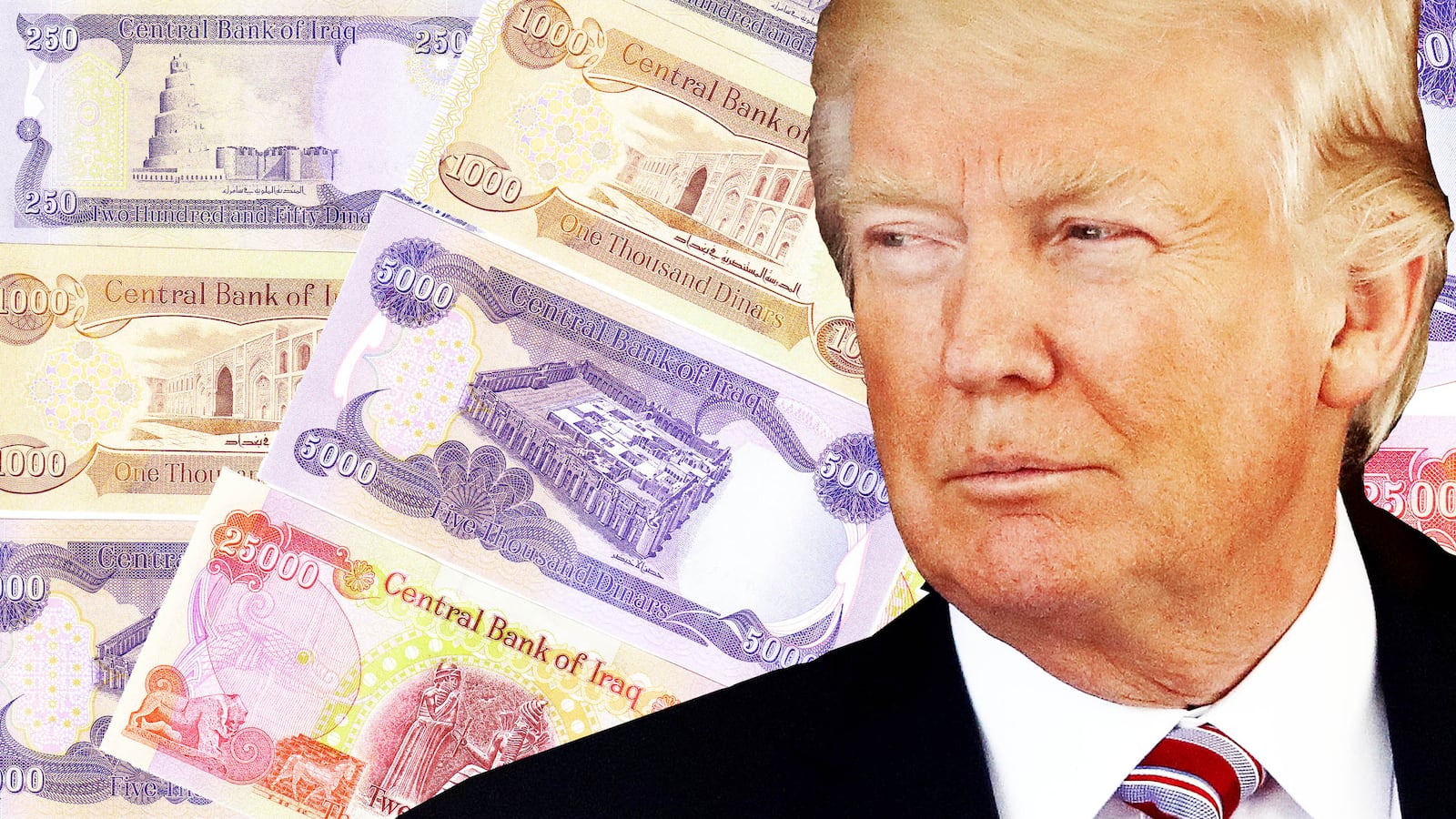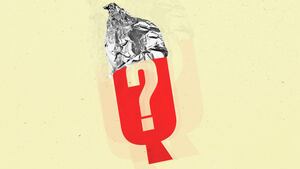Trump supporter Hayes Kotseos runs a North Carolina pool-maintenance company, but she’s got a side bet that she thinks might make her fabulously wealthy: the Iraqi dinar.
The currency is nearly worthless outside of Iraq, but Kotseos bought millions of dinars in April, after watching a video of President Trump at a 2017 press conference. In the clip, Trump says, with characteristic vagueness, that all currencies will soon “be on a level playing field.”
In reality, Trump was talking about trade imbalances with China. But like other Trump supporters who have fallen into the dinar investment scam, which has existed since at least 2012, Kotseos interpreted Trump’s rambling statement as proof that the Iraqi dinar would soon be worth as much or even more than the dollar, making anyone who had been smart enough to buy in early a millionaire.
“I love my president, and I was like, ‘Oh my God,’” Kotseos told The Daily Beast.
The purchase, Kotseos said, cost her and her husband somewhere between $5,000 and $10,000, counting the cut to the company that sold them the dinars. Two of her adult children have bought millions more dinars, too.
Like other investors in the incredibly long-shot dinar scheme, Kotseos hopes that Trump and the Iraqi government will somehow “revalue” or “RV” the currency, boosting its current value of less than $0.001 to $3 or $4.
Dinar promoters have claimed that near-mythical event will occur for nearly a decade. But if it does it would theoretically make a millionaire of anyone with the foresight to put just a few thousand dollars into dinars.
“If it happens, it’ll be awesome and there’ll be a huge party at my house,” Kotseos said.
The rumored wealth surrounding the dinar dates back to its pre-Gulf War price, when each dinar was more than $3. But sanctions and years of war have pummeled its value to less than one-tenth of one U.S. penny.
Unfortunately for American investors, the long-awaited “RV” never seems to come.
The persistently low value has inspired warnings from state regulators and several indictments against dinar sellers accused of misleading investors about the currency’s prospects. But that hasn’t stopped dinar investors from buying and counting on the much-awaited “RV” to make them rich.
While it’s difficult to measure how many Americans have invested in the dinar, court papers related to dinar scams often mention millions of dollars worth of dinar purchases. Dinar holders regularly tweet at Trump and various Iraqi government Twitter accounts, demanding to know when they’ll finally enact the “RV” that will let the money flow in.
The dinar scam has become particularly Trump-centric since 2015, over rumors that Trump has personally invested in the dinar (there’s no evidence that he actually does). Search-engine searches related to Trump and the dinar have shot up, according to Google Trends, returning hoax articles claiming Trump has bought millions of dollars worth of dinars.
Trump supporters like Kotseos have also been drawn in by videos showing the “prophecy” of Kim Clement, a South African “prophet” whose fans believe predicted Trump’s election. Before his death in 2016, Clement also often mentioned a dinar revaluation.
“It was like, OK, well, God said the Iraqi dinar is going to revalue,” Kotseos told The Daily Beast.
Dinar-related threads on Twitter and YouTube fill up with Trump supporters asking the president to somehow force the revaluation.
“MR TRUMP. I really admire you….please help us with this RV,” wrote one Twitter user. Another asked Trump to increase the dinar’s value to “give us the financial tools we need to support your efforts.”
In a video on one of Clement’s prophecies about the dinar, a Trump supporter insisted in October that Trump was central to the whole plan.
“President Trump is KEY,” the commenter wrote. “Nobody thought he would win, he will trigger the IRAQ RV.”
Jay Addison, an attorney who follows financial scams, watched for six years as dinar believers’ hopes for a revaluation failed to materialize. After writing a 2012 blog post about why the dinar was a bad investment, Addison heard from dinar investors who insisted the RV was about to occur.
Six years later, it still hasn’t happened.
Addison, who calls the hype around the dinar a “study in stupidity,” said he’s personally encountered dinar investors who were otherwise savvy in business but became entranced by the prospect of instant riches.
“I’ve had a few clients fall for it,” Addison said. “They weren’t really the sharpest knives in the drawer.”
It’s not that the revaluation is totally impossible, according to Addison. It’s that companies that sell dinars and dinar “gurus” vastly exaggerate the likelihood of a revaluation.
“They’re basically told that it’s a sure thing. Nine out of 10,” Addison said. “When it’s actually one in a hundred billion.”
Kotseos, like other dinar holders, have found support in dinar communities online.
The investors, who call themselves “Dinarians,” gather on forums with names like Dinar Detective to dissect every news item for what, if anything, it could mean for their dinar. On another site, Dinar Vets, would-be posters have to verify or “dinar-ify” themselves by posting a picture of their dinars to prove that they are really committed to the cause.
Other fans post dinar “unboxing” videos on YouTube, filming themselves as they open envelopes filled with the dinars they hope will make them wealthy. On Facebook, some dinar groups are devoted to praying for the dinar revaluation to come sooner.
But the dinar-specific corners of the internet are also rife with manipulation. In October, the owners of a Georgia-based dinar reseller that made $600 million selling the dinar and other currencies were convicted of fraud for misleading investors about the dinar’s chances to gain value.
Their scheme, according to prosecutors, included paying off a dinar “guru” to tell his fans in chat rooms and conference calls that he had high-level sources in American and Iraqi government and international financial institutions who were sure a revaluation was imminent.
Dinar holders had what one of the accused sellers described as a “cult-like” devotion to their dinar guru’s news. But according to prosecutors, those government “sources” were entirely fictitious.
The most devoted dinar investors tend to become obsessed with the minute details of Iraqi politics, convincing themselves that a new director of the Iraqi central bank or a particular infrastructure program in Nineveh is all that stands between them and millions of dollars.
Kotseos herself has dived headfirst into the dinar internet, tweeting regularly about her RV theories. She’s also invested in the Vietnamese dong, a dinar rival that’s worth even less, and she has strong feelings about various Iraqi politicians.
“With what’s going on in Iraq right now, everything is so hopeful,” Kotseos said.
Kotseos also spends a portion of each day in a dinar chatroom, where dinar holders try to convince one another that their investment will eventually pay off. Instead, she tries to promote “hopium”—dinar-world slang for optimism about the currency.
“Some people get a little negative,” said Kotseos, who also tweets about the pro-Trump QAnon conspiracy theory. “You’ve gotta squish it fast. We just support each other.”
Kotseos said her family can afford to lose their dinar investments, if the currency never appreciates. But she’s convinced that she’ll be able to resell her dinar and at least recover a majority of her investment.
Those prospects are actually somewhat unclear. Many resellers will only buy back a portion of the dinars they sell, and they tend to sell them at already inflated prices.
But for now, Kotseos isn’t selling. She said she has seen ads offering to buy back dinar, but she ignores them.
“You’re not getting my dinar,” Kotseos said.







